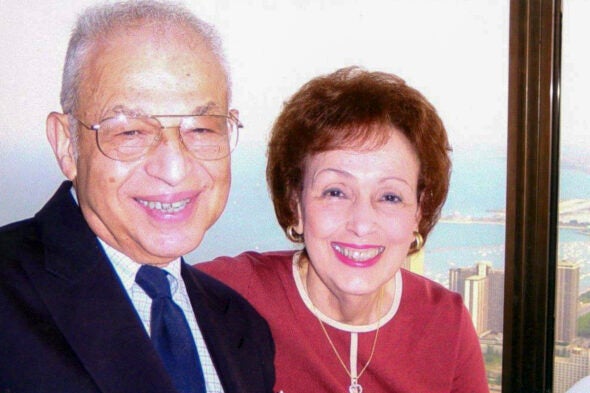UIC College of Pharmacy gets new name following transformational gift
With the help of a major gift from the estate of a distinguished alum and his wife, the University of Illinois Chicago College of Pharmacy will quadruple its merit-based scholarships and double down on its commitment to equity and clinical excellence.
The newly named Herbert M. and Carol H. Retzky College of Pharmacy was unveiled Friday, Sept. 13, following a dedication to mark the $36 million endowment gift from the estate of Herbert, ’46, and Carol Retzky, who was awarded an honorary degree in 2019. The donation cements the Retzkys’ legacy of advancing pharmacy education at UIC and drives innovative careers in the field while honoring the couple’s longstanding dedication to pharmacy and transformational support.
Both children of pharmacists, the Retzkys operated the pharmacy of Herbert Retzky‘s father on Chicago’s South Side before selling that business and purchasing Hale Drugs in the Galewood neighborhood in 1957. Throughout his career, Herbert Retzky remained interested in pharmacy’s evolution. For 25 years, he attended a continuing education program on infectious diseases hosted by the College of Pharmacy, and he served as an alumni representative on several committees at the college, helping to evaluate courses and guide the curriculum.
UIC’s College of Pharmacy is the top-rated college of pharmacy in Illinois and is ranked 15th in the nation, according to U.S. News & World Report. The college is a leader in drug discovery and has introduced several life-changing drugs to the market. The program boasts two special curriculums — one in urban pharmacy and the other in rural pharmacy — where students are trained to address the issues specific to these communities. Remedying “pharmacy deserts,” where a lack of access to care disproportionally affects underrepresented groups, is a focus in both curriculums.

“What differentiates a graduate of the UIC College of Pharmacy is a deep clinical training that is not commonly received at other schools of pharmacy,” College of Pharmacy Dean Glen Schumock said. “And there’s a reputation, really across the nation, for our graduates in terms of their abilities and how they can come into and are prepared for practice when they graduate.”
The UIC experience had a visible impact on the Retzkys, who were the university’s largest individual philanthropic donors during their lives, giving more than $44 million in financial support.
The Herbert M. and Carol H. Retzky College of Pharmacy will be the first donor-named college at UIC and only the fourth in the University of Illinois System.
Schumock characterized the late couple’s gift as “profoundly transformative” for the college and said it promises to elevate the caliber of pharmacy students attending the university.
“Above all, Herb and Carol wanted to help people and help the profession,” Schumock said. “Their gifts will help so many students and future pharmacists.”
Originally established independently as the Chicago College of Pharmacy in 1859, the College of Pharmacy is the oldest college in the University of Illinois System and one of the oldest colleges of pharmacy in the U.S. In 1895, the Illinois legislature amended the University of Illinois’ charter, which paved the way for the university to acquire the Chicago College of Pharmacy and move it to the Illinois Medical District in 1915, where it has remained ever since. In 2010, the College of Pharmacy opened a campus in Rockford to expand its impact outside the city.
Roughly 80% of the endowment funds are earmarked for merit-based scholarships. The Retzkys’ generosity raises the amount of merit scholarships available at the college from approximately $200,000 each year to well over $1 million.
The remaining amount will fund career development initiatives for students. This includes initiatives such as job placement resources and student-alum engagement programs that will expose students to innovative careers in the profession.
“With the Retzky gift, we are supporting students who will go out and serve communities and help address health inequities,” UIC Chancellor Marie Lynn Miranda said. “We are supporting research that is designed to bring innovations not just to the people who are immediately served here at UIC, but to the entire city, to the entire state, to the entire country.”
